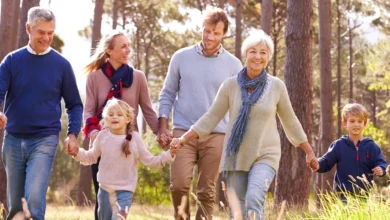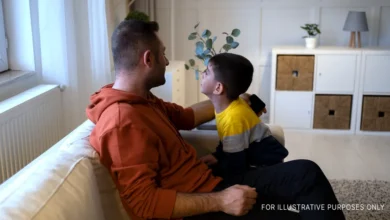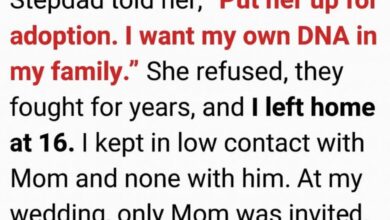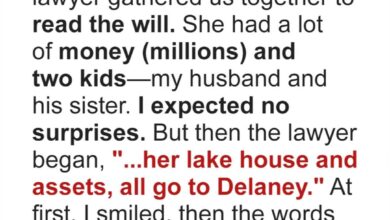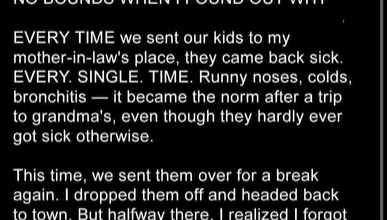My Birth Family Contacted Me After 31 Years with an Outrageous Request — Am I Wrong for How I Reacted?
I was adopted as an infant after being found abandoned in an alley. No one claimed me, so I was placed with a loving family. Recently, I got engaged, and thinking about kids made me realize I have no proper medical history to draw from. I did a 23&Me test but messed up and accidentally made myself discoverable. That’s how my birth family found me. Two siblings reached out and then shocked me to the core by claiming I should donate a kidney to our dying father.
I stared at the message on my phone, my heart pounding. My fiancé, Marcus, was in the kitchen making coffee, oblivious to the bomb that had just dropped into my life. I read the message again, hoping I’d misunderstood. But no, it was clear: “Our dad is in end-stage renal failure. You’re a match. We need your help.”
I felt a mix of emotions—anger, confusion, and a strange, unwelcome sense of guilt. How could they ask this of me? They’d abandoned me as a baby, and now, three decades later, they wanted a piece of me—literally. I didn’t even know their names until a week ago.
The first message had come from a woman named Tessa, who claimed to be my older sister. She’d been polite at first, saying she was happy to finally find me and that the family had always wondered what happened to me. I’d been cautious but curious, asking questions about my birth parents and why I’d been left behind. She’d been vague, saying it was a “complicated situation” and that our mother had passed away years ago. Then, a few days later, her brother, Eli, messaged me with the kidney request.
I didn’t know what to do. Part of me wanted to block them and pretend this never happened. But another part of me—the part that had always wondered where I came from—was intrigued. What if this was my chance to understand my past? What if helping them could give me some closure?
Marcus walked into the living room, holding two mugs of coffee. He took one look at my face and knew something was wrong. “What’s going on?” he asked, sitting beside me.
I handed him my phone. He read the message, his eyebrows shooting up. “Wow. That’s… a lot.”
“What do I do?” I asked, my voice trembling.
He thought for a moment. “You don’t owe them anything. But if you want to meet them, I’ll support you. Just be careful, okay?”
I nodded, grateful for his steady presence. After some back-and-forth, I agreed to meet Tessa and Eli at a café in the city. I needed to see them face-to-face, to understand who they were and why they thought this was okay.
The day of the meeting, I was a nervous wreck. Marcus offered to come with me, but I needed to do this alone. I walked into the café and spotted them immediately—Tessa had the same curly hair as me, and Eli had my nose. It was surreal, seeing people who looked like me for the first time.
We exchanged awkward pleasantries before diving into the heavy stuff. Tessa explained that our father, a man named Victor, had been sick for years. He’d been on dialysis, but his condition was worsening. They’d all been tested as potential donors, but none of them were a match. When they found me through the DNA database, they’d been shocked—and hopeful.
“We know this is a huge ask,” Eli said, his voice earnest. “But you’re our only chance.”
I felt a lump in my throat. “Why should I help him? He left me in an alley. He didn’t care what happened to me.”
Tessa looked down at her hands. “It wasn’t like that. Mom was struggling with addiction, and Dad was trying to take care of us. He thought leaving you somewhere public was the best way to make sure you’d be found and taken care of. He didn’t want to, but he felt like he had no choice.”
I didn’t know what to believe. Their story painted a picture of a desperate man making impossible decisions, but it didn’t erase the pain of being abandoned. Still, I agreed to meet Victor, to see him for myself.
The hospital room was dimly lit, and the man in the bed looked frail. His eyes lit up when he saw me, and he reached out a shaky hand. “You look just like your mother,” he said, his voice weak.
I sat beside him, my emotions swirling. He told me his side of the story, how he’d loved my mother but couldn’t save her from her demons. How he’d tried to raise their children but couldn’t afford another mouth to feed. He apologized over and over, tears streaming down his face.
I left the hospital feeling torn. Part of me wanted to help him, to show him the kindness he hadn’t shown me. But another part of me was still angry, still hurt. I spent days wrestling with the decision, talking it over with Marcus and my adoptive parents. In the end, I decided to get tested. If I wasn’t a match, the decision would be out of my hands.
But I was a match.
The doctors explained the risks and the recovery process, but all I could think about was the man in the hospital bed. He wasn’t just some stranger—he was my father. And despite everything, I couldn’t let him die if I had the power to save him.
The surgery was scheduled for a month later. In that time, I got to know Tessa and Eli better. They weren’t perfect, but they were trying to make amends. We talked about our childhoods, our dreams, and our regrets. I started to see them not just as the people who’d abandoned me, but as flawed humans who’d made mistakes.
The day of the surgery, I was terrified. Marcus held my hand as they wheeled me into the operating room. When I woke up, the first thing I saw was his face, smiling down at me. “It went well,” he said. “You did it.”
Recovery was tough, but Tessa and Eli were there every step of the way. They brought me meals, helped me around the house, and even apologized for how they’d approached me initially. “We were desperate,” Tessa admitted. “But we shouldn’t have sprung it on you like that.”
As I healed, so did my relationship with my birth family. Victor’s health improved, and he thanked me endlessly. I didn’t forgive him overnight, but I started to understand him. And in helping him, I found a sense of peace I hadn’t known I was missing.
The experience taught me that life is messy and complicated, but it’s also full of opportunities for growth and connection. Sometimes, the hardest decisions lead to the most rewarding outcomes. I didn’t just save my father’s life—I found a family I never knew I had.
If you’ve ever faced a difficult choice or struggled with forgiveness, I hope my story reminds you that it’s never too late to make a difference. And if you enjoyed this story, please share it with someone who might need a little inspiration today. Life is short, but it’s also full of second chances. Let’s make the most of them.
